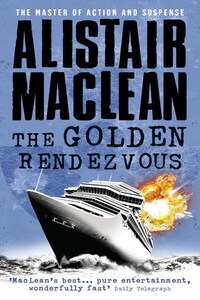Once again Captain Jensen and the British lieutenantgeneral were back in the Operations Room in Termoli, but now they were no longer pacing up and down. The days of pacing were over. True, they still looked very tired, their faces probably fractionally more deeply lined than they had been a few days previously: but the faces were no longer haggard, the eyes no longer clouded with anxiety, and, had they been walking instead of sitting deep in comfortable armchairs, it was just conceivable that they might have had a new spring in their steps. Both men had glasses in their hands, large glasses.
Jensen sipped his whisky and said, smiling: ‘I thought a general’s place was at the head of his troops?’
‘Not in these days, Captain,’ the General said firmly. ‘In 1944 the wise general leads from behind his troops – about twenty miles behind. Besides, the armoured divisions are going so quickly I couldn’t possibly hope to catch up with them.’
‘They’re moving as fast as that?’
‘Not quite as fast as the German and Austrian divisions that pulled out of the Gustav Line last night and are now racing for the Yugoslav border. But they’re coming along pretty well.’ The General permitted himself a large gulp of his drink and a smile of considerable satisfaction. ‘Deception complete, break-through complete. On the whole, your men have done a pretty fair job.’
Both men turned in their chairs as a respectful rat-a-tat of knuckles preceded the opening of the heavy leather doors. Mallory entered, followed by Vukalovic, Andrea and Miller. All four were unshaven, all of them looked as if they hadn’t slept for a week. Andrea carried his arm in a sling.
Jensen rose, drained his glass, set it on a table, looked at Mallory dispassionately and said: ‘Cut it a bit bloody fine, didn’t you?’
Mallory, Andrea and Miller exchanged expressionless looks. There was a fairly long silence, then Mallory said: ‘Some things take longer than others.’
Petar and Maria were lying side by side, hands clasped, in two regulation army beds in the Termoli military hospital when Jensen entered, followed by Mallory, Miller and Andrea.
‘Excellent reports about both of you, I’m glad to hear,’ Jensen said briskly. ‘Just brought some – ah – friends to say goodbye.’
‘What sort of hospital is this, then?’ Miller said severely. ‘How about the high army moral tone, hey? Don’t they have separate quarters for men and women?’
‘They’ve been married for almost two years,’ Mallory said mildly. ‘Did I forget to tell you?’
‘Of course you didn’t forget,’ Miller said disgustedly. ‘It just slipped your mind.’
‘Speaking of marriage –’ Andrea cleared his throat and tried another tack. ‘Captain Jensen may recall that back in Navarone –’
‘Yes, yes.’ Jensen held up a hand. ‘Quite so. Quite. Quite. But I thought perhaps – well, the fact of the matter is – well, it so happens that another little job, just a tiny little job really, has just come up and I thought that seeing you were here anyway …’
Andrea stared at Jensen. His face was horrorstricken.
Commander Vincent Ryan, RN, Captain (Destroyers) and commanding officer of His Majesty’s latest S-class destroyer Sirdar, leaned his elbows comfortably on the coaming of his bridge, brought up his night-glasses and gazed out thoughtfully over the calm and silvered waters of the moonlit Aegean.
He looked first of all due north, straight out over the huge and smoothly sculpted and whitely phosphorescent bow-wave thrown up by the knife-edged forefoot of his racing destroyer: four miles away, no more, framed in its backdrop of indigo sky and diamantine stars, lay the brooding mass of a darkly cliff-girt island: the island of Kheros, for months the remote and beleaguered outpost of two thousand British troops who had expected to die that night, and who would now not die.
Ryan swung his glasses through 180° and nodded approvingly. This was what he liked to see. The four destroyers to the south were in such perfect line astern that the hull of the leading vessel, a gleaming bone in its teeth, completely obscured the hulls of the three ships behind. Ryan turned his binoculars to the east.
It was odd, he thought inconsequentially, how unimpressive, even how disappointing, the aftermath of either natural or man-made disaster could be. Were it not for that dull red glow and wisping smoke that emanated from the upper part of the cliff and lent the scene a vaguely Dantean aura of primeval menace and foreboding, the precipitous far wall of the harbour looked as it might have done in the times of Homer. That great ledge of rock that looked from that distance so smooth and regular and somehow inevitable could have been carved out by the wind and weather of a hundred million years: it could equally well have been cut away fifty centuries ago by the masons of Ancient Greece seeking marble for the building of their Ionian temples: what was almost inconceivable, what almost passed rational comprehension, was the fact that ten minutes ago that ledge had not been there at all, that there had been in its place tens of thousands of tons of rock, the most impregnable German fortress in the Aegean and, above all, the two great guns of Navarone, now all buried for ever three hundred feet under the sea. With a slow shake of his head Commander Ryan lowered his binoculars and turned to look at the men responsible for achieving more in five minutes than nature could have done in five million years.














